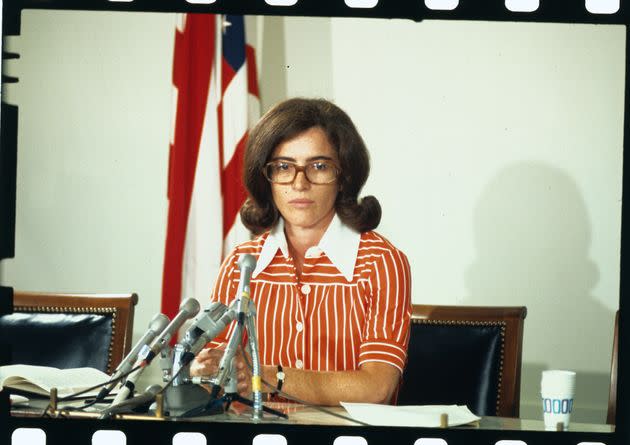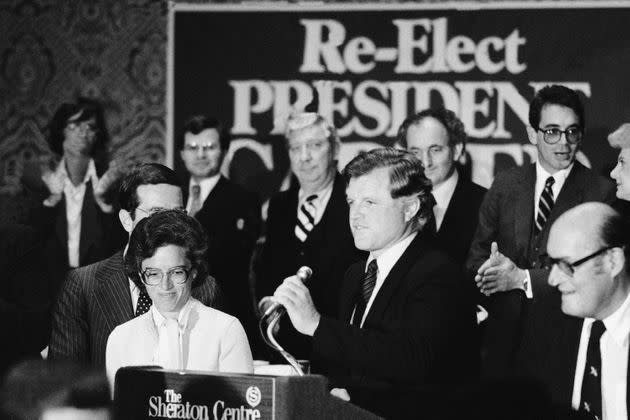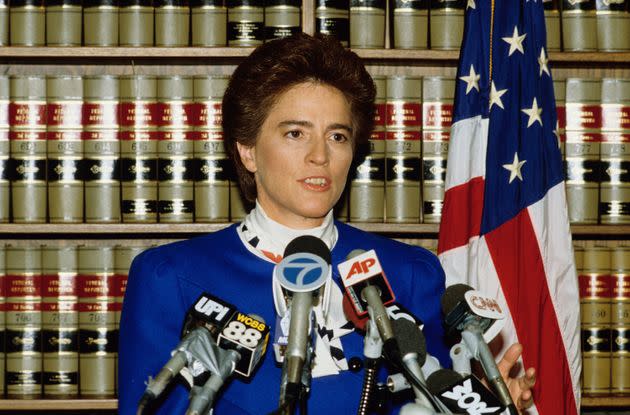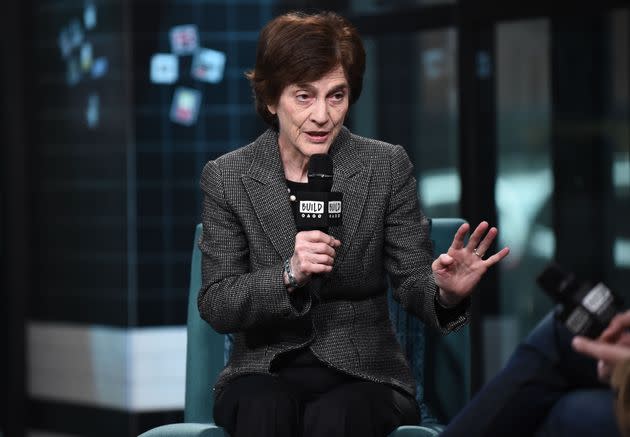Q&A With Elizabeth Holtzman: Pioneering Former Rep. Wants To Help A Country ‘In Crisis’

Elizabeth Holtzman, a former member of Congress, prosecutor, and city comptroller, is competing to represent New York City in the House once again. (Photo: Hans Pennink/Associated Press)
NEW YORK ― At age 80, former Rep. Elizabeth Holtzman (D-N.Y.) boasts a career full of history-making accomplishments.
A graduate of Harvard Law School who’d worked in the civil rights movement, she unseated a 50-year incumbent in 1972 at the age of 30, making her the youngest woman ever elected to Congress at the time. She distinguished herself in Washington as an outspoken voice against government secrecy and overreach, voting to impeach President Richard Nixon while serving on the House Judiciary Committee in 1974.
Holtzman was elected district attorney in Brooklyn in 1981, becoming New York City’s first female prosecutor. And in 1989, she became the city’s first woman ― and to this day, the only one ― to serve as comptroller.
Holtzman has had her share of election losses as well, coming up short in runs for the U.S. Senate in 1980 and 1992, and in her bid for re-election as comptroller in 1993.
Thanks in part to her experience holding Nixon accountable, however, Holtzman re-emerged in the national spotlight during the administration of former President Donald Trump. In 2018, she left the Department of Homeland Security’s advisory committee in protest of Trump’s policy of separating undocumented migrant parents from their children. Later that year, she published a book that attracted significant media attention, “The Case for Impeaching Trump.”
But Holtzman, who enjoys kayaking with friends in her downtime, believes her work is still unfinished. The combination of Trump’s efforts to overturn the 2020 election and the Supreme Court’s revocation of a federal right to abortion have prompted the longtime resident of downtown Brooklyn to run in New York’s newly drawn 10th Congressional District.
Holtzman is one of 13 candidates competing in the state’s Aug. 23 Democratic primary for a district that encompasses lower Manhattan and a cluster of neighborhoods in central and southern Brooklyn.
HuffPost is running an interview series with the 10th District candidates. Check out our previous interviews with Carlina Rivera, Bill de Blasio, Yuh-Line Niou, Mondaire Jones, Jo Anne Simon and Dan Goldman.
Over slices of zucchini bread at a downtown Brooklyn café, HuffPost asked Holtzman what a single member of Congress can actually do to defend democracy, which investigations she would prioritize, and how her legislative experience shapes her view of foreign policy, health care and the economy.
This interview has been edited for clarity and length.

Rep. Elizabeth Holtzman (D-N.Y.) speaks to reporters in 1973 about her lawsuit seeking to end the U.S. government's bombing of Cambodia, which she argued was illegal. (Photo: Bettmann/Getty Images)
When you first won in 1972, you were the youngest woman ever to win a seat in Congress. Now you would be the oldest first-term member of Congress. Why come back now to run?
Because the country is in crisis. We’re facing perhaps the biggest threat we’ve ever faced ― except for World War II, and maybe even more serious than that, because we have internal forces that are trying to destroy our democratic institutions. We have an extremist Supreme Court that wants to take us back to maybe even before the founding of our country. We have a former president who’s trying to destroy our electoral system around the country so that he can win no matter what the votes are, even though we’re supposed to be a democracy. We have a right-wing Congress that is enabling both the former president and the Supreme Court.
So this is not a time for just trying your wings. This is a critical time for people who can bring the experience, the proven track record, the guts, the know-how and the leadership that’s required in this time. If we weren’t in this dangerous position, I wouldn’t even be thinking about this.
I understand that you have a wealth of experience, but there are obviously limits to what a single House member and freshman lawmaker can do against a president ―
Really? Really? Of course there are, but I’ll tell you what I did just in my first term in Congress. Nixon had this idea that he was going to create a State Secrets Act, which he slipped through the court system. Nobody really understood what was happening. But there were a few people who understood: I understood, and [North Carolina Democrat] Sam Ervin in the Senate ― a great constitutional scholar.
By March of 1973 ― and I was sworn in in January ― we had a bill passed into law that I introduced stopping that. I was one person on the House side getting the Senate to go along and stop the State Secrets Act. Perhaps, if Nixon’s bill had passed, Watergate might not have been unlawful.
Don’t say to me, “What can one person do?”
I was one person. And in 1974 ― also my first term ― I learned that there were Nazi war criminals in America. They came here after World War II. They’d been here for 35, 40 years.
Did anybody do anything? No. I exposed their presence and called for changes in our laws. And guess what? More than 100 Nazi war criminals were brought to justice and expelled from the United States.
One person! One person!
By the way, [President] Gerald Ford showed up to talk about the Nixon pardon to the Congress. That was also in my first term. Not one Democrat asked him a single tough question about it. The American people want to know whether there was a deal. Guess who asked him whether there was a deal, to his face? I did. He never answered the question. But I’m not afraid to do that.
I don’t buy your argument that one person can’t make a difference.Former Rep. Elizabeth Holtzman (D-N.Y.), now a candidate for New York's 10th Congressional District
I brought a lawsuit against the bombing of Cambodia. We won a landmark ruling in district court. The president of the United States was illegally bombing Cambodia on his own, even though Congress passed a law saying, “You can’t do it.”
Can you win every time by yourself? No. Can you start something by yourself? Yes. Can you win sometimes by yourself? Yes.
And on racial discrimination in jury selection, I was the only DA in America ― not just Brooklyn, not just New York City, not just the Northeast ― the only DA in America to call on the Supreme Court to end the racial discrimination practice of using racially based peremptory challenges to remove Blacks from the jury. So the Supreme Court listened to me. They bought the argument that my office made.
So I don’t buy your argument that one person can’t make a difference.
Let’s say you get to Congress again. On day one, what does it look like to initiate something against Trump? What would you immediately do?
Trump? He’s not the only one. Why are you thinking only “Trump”? And why would I wait until I actually took office?
Democrats may lose the majority in January. I hope not. I haven’t given up hope. But there’s that possibility. So Congress needs to do things now.
One of the things that has to be done is to look at the Supreme Court. People are talking about legislation to do X and Y and change the composition and so forth. Those are things definitely worth looking at. We may not have the votes for it; we may not have the votes even in this Congress to do that.
But we certainly control the investigative process. And Congress needs to be looking at at least two things in our Supreme Court. Mr. Brett Kavanaugh ― [the] investigation [into alleged sexual misconduct] was never finished, ever, and it should be. Maybe there’s nothing there. Maybe he entirely told the truth ― or maybe he didn’t. The American people are entitled to know that, because the Supreme Court is now making decisions taking constitutional rights away from people and we need to know whether they’re acting in a legitimate fashion.
[Justice] Clarence Thomas is the second person. I’m not giving it priority, in terms of who should be investigated first. But Congress needs to look at the role that Clarence Thomas played with regard to his failure to recuse himself from votes, with regard to disclosing certain matters, or with regard to conspiring with his wife in the forcible overthrow of government.
The American people are entitled to know if, when somebody wants to take away constitutional rights, whether that person is properly in that position to do that.
Given how you envision your role ― using investigative powers to their fullest ― is there anybody whose work in the current Congress you respect?
I can’t say I followed somebody in their entire work product. But there are people that have impressed me with the seriousness of their purpose, and with the work they’ve done. There are people whom I respect a lot.

Holtzman, center left, and Sen. Edward Kennedy (D-Mass.), center right, speak at an event in support of President Jimmy Carter's reelection in October 1980. (Photo: Perez/Associated Press)
How do you think President Joe Biden is doing?
I strongly supported him because I thought he was the only one who could defeat Donald Trump. I didn’t always agree with his policies. But the first order of business was to defeat Donald Trump. And he did that. He deserves a lot of credit for that. He should have the country’s undying gratitude for that.
Are there things I would have done differently? Maybe. Probably.
What would you have done differently?
Maybe it’s a matter of just tone or style, but I would have liked to see them act more quickly with a to-do list in response to the [Supreme Court’s] abortion decision. We knew for a long time it was coming. That doesn’t mean he’s not going to get there and do exactly what needs to be done. So as I said, it’s just a matter of style and approach and so forth. He’s a deliberative kind of person, which is a good thing.
Do you support his reelection?
Let me see what happens. I’m running for my own election now ― or reelection ― so it’s really premature to comment.
We came to Congress together. So I’ve known Joe Biden for a very long time. He’s a very pleasant person. We have a wonderful photo of the two of us where we are meeting after we hadn’t seen each other in three or four years. There’s such a big grin on both of our faces. It wasn’t just posing for the camera. He’s a very caring, decent person. And it’s nice to have that in the presidency.
You mentioned your work trying to stop the U.S. bombing of Cambodia. What did you think of the United States’ withdrawal from Afghanistan?
I don’t know that many Americans would have objected to the decision, but it looked very disorderly. We have an image always somehow that we win all wars and they’re all kind of contained. It’s like a video game. War isn’t a video game.
Could it have been handled differently? Possibly, probably.
But retreats can be very problematic. I was there in Vietnam. That wasn’t a pleasant scene either. And as much as they prepared, they hadn’t prepared [enough].
No system can tolerate abuses of power, whether it’s in the corrections system, or the police force, or in the prosecutorial system.Elizabeth Holtzman
You’re a former prosecutor, and there have been tremendous debates in this country over policing and criminal justice reform. Do you believe that certain elements on the left have ever gone too far in their push for certain reforms? And if so, what balance would you strike?
I really like to talk about me in this race, and what I bring to it. So here’s a good example. When I was DA, I did several really important things that hadn’t been done. I brought women and minorities to top positions. When I discovered the issue of racial discrimination in jury selection, we litigated that all the way up to the Supreme Court. My office is noted in a footnote in that decision. Justice [John Paul] Stevens complimented the work of my office.
On women’s rights, we challenged the state’s exemption for marital rape. It wasn’t a crime for a husband to rape his wife. We were the only DA in New York state to challenge that. The court agreed with us.
I created the first bureau in New York City ― maybe in the state ― that was designed to deal with problems of misuse of force by police officers. I had 5,000 cops protesting me. Guess what? They left. They’re not going to spend more than a couple of hours protesting. And the unit stayed.
No system can tolerate abuses of power, whether it’s in the corrections system, or the police force, or in the prosecutorial system. It can’t.
On the other hand ― and sometimes people don’t want to acknowledge this ― there are people who are dangerous. We dealt with it. Every day, I got the reports of murders in Brooklyn and the abuse of children in Brooklyn.
Could we do a better job? Could we figure out how to do the job in a more humane, efficient way? I’m sure that’s possible. But there’s not a lot of pressure to rethink it, even now.
The whole issue of policing needs to be rethought from the point of view of: How do we recruit the best people into the police force? How do we screen out those who are going to be abusive? What are our present practices? Who’s looking at that? I have no problem with examining training systems, recruitment systems, disciplinary systems.
People have to be held accountable, but you also have to pick the best people, you have to pick the right people. You have to train them properly. You have to supervise them properly. That happens in every business, not just government.
Those are things that I think need to be done, and there’s no “left” or “right” about that, in my opinion.

Holtzman, as Brooklyn district attorney, addresses the press after the conviction of Carmine Persico, boss of the Colombo crime family, in November 1986. (Photo: Yvonne Hemsey/Getty Images)
What sort of federal policing reform legislation would you support? The House passed a version of the George Floyd Justice in Policing Act last Congress that would have banned chokeholds nationally. Would you have voted for that? What sort of federal provisions would you envision supporting?
I don’t want to give a glib answer here. You can say “no chokeholds,” “no this hold,” “no that hold” ― whatever. I think all of that may be important.
But the more important thing is: How do we train people? How do we recruit them? How do we supervise them? How do we discipline them? How do we do it in a way that produces the results that we want?
What kind of job do you think Bill de Blasio did as mayor?
I’m not going to comment on my opponents in this race at all.
Do you think it’s appropriate for somebody to move to the district from outside of the district?
The voters will have to make that decision.
You try doing everything you can incrementally.Elizabeth Holtzman
You began your career as a lawmaker in the 1970s. We are seeing a return of what some people feel are the maladies of the 1970s. Specifically, I’m thinking about inflation. What should Congress or the president do about it?
If we could predict the future, probably none of us would be doing what we’re doing now. We can’t. There’s some things we know make a difference. And we’re always looking at the past, but the past had different factors at work. So I think just a little humility is part of the process, but obviously there are things that can be done.
The [Federal Reserve] is tightening interest rates, so is that going to work? If it doesn’t work, then what else has to be done? I’m not going to say yet, because we don’t know yet whether these actions by the Fed will have the desired effect.
Maybe we should be looking at some of the bottlenecks in our system and price gouging that’s going on, and take some action against it. Oil companies are sitting on leases on government land and not drilling. What’s happening there?
There’s been a lot of discussion in recent years about Medicare for All or a single-payer health care system. And then there are a host of other options that are more moderate in nature. What kind of reforms would you want to see us make to the U.S. health care system?
Health care should be a basic human right. But I’m also somebody who says, “I’m going to take half a loaf if I get it.” It’s better than nothing. Although we didn’t have those Medicare for All bills when I was in Congress. But I do support as broad a protection as possible for the American people, whether it’s Medicare for All or some other system or public option.
Is that a bad thing if you didn’t solve the whole problem? Definitely not. You try. You try doing everything you can incrementally.
With regard to the Affordable Care Act, another evil that the Supreme Court did is [to] say that the federal government could not require states to expand Medicaid. Where’d that come from? Wonderful gifts they’ve given us.

Holtzman discusses her book "The Case for Impeaching Trump" in New York City in December 2018. She reemerged in the national media spotlight during the Trump administration. (Photo: Daniel Zuchnik/Getty Images)
What do you think about the shift toward a narrower interpretation of antitrust laws that took a more lax approach to corporate consolidation than the one that dominated during the New Deal era?
I am not an expert enough to give you an answer on that.
Do you envision yourself becoming a member of the Congressional Progressive Caucus?
I’m not going to pigeonhole myself, period. I’m not going to do that. I support many progressive efforts.
I was a very progressive member of Congress. I’ll leave it at that. I’m not going to let anyone else define it for me. I stood up for women’s rights, human rights of every kind. I was in the South in the early days of the civil rights movement when I was a law student. I helped to found a national civil rights organization that brought law students to the South.
If [Democratic] Congressman Jerry Nadler loses, there will no longer be a Jewish member of Congress for New York City. You could potentially fill that gap. Is it important for New York City to have a Jewish member of Congress?
I could see how it was important in my prior service in Congress. But it depends who the person is. Just being a member of a certain group doesn’t mean you’re going to stand up in the right way or do anything else effective.
Of course, it’s wonderful to have various groups present in Congress. It makes the work of the body much more representative of the country. But just having a person who is of the right ethnic group or religion doesn’t mean that you’re going to get someone who’s a fighter and leader.
Do you think that the U.S. shows the appropriate amount of support for Israel? Should it take a tougher approach? A more generous approach?
I have a twin brother. When I was a child, my grandmother sat us down in front of the radio the day the state of Israel was created. She said, “I never want you to forget this day, ever in your life.”
So I haven’t. I might not remember the date. But I will never forget my grandmother saying that to me and my brother. There’s a kind of bottom line: Israel was the sanctuary for Jews when no one else would give them sanctuary, including the United States.
And on the other hand, it’s not enough to be a sanctuary. It also has to be, from my point of view, ethical in its behavior as a country. So there are areas in which there are concerns about Israel, but the bottom line is its survival. We still live in a world, not just with antisemitism, but where antisemitism is growing ― even in the United States.
I strongly support the survival of the state of Israel. I have been there many times. But I do believe in a two-state solution. I did support Obama’s Iran treaty. I worked to try to get people to support it.
Do you see yourself more as an AIPAC person or a J Street person?
I’m not a person who likes to be pigeonholed.
Do you think that the United States could show more of a “tough love” approach when it comes to some of the disagreements on ethical issues that you cite ― including, for example, putting on the table conditions on how Israel spends the aid it receives from the United States?
I haven’t been deeply involved in Israel’s foreign-affairs issues in a granular way in a very long time. Negotiating with foreign countries is not easy. Sometimes it’s easier than you think, and sometimes it’s harder than you think. It’s very easy to talk about it from the outside when you don’t know what’s happening.
This article originally appeared on HuffPost and has been updated.

 Yahoo Sports
Yahoo Sports 